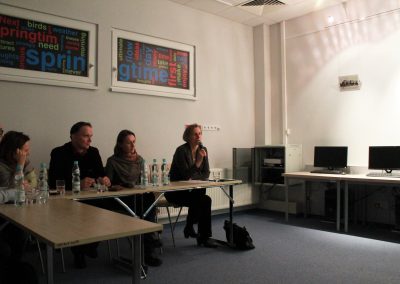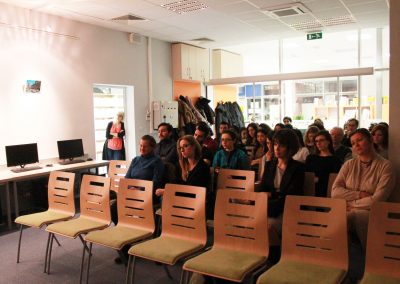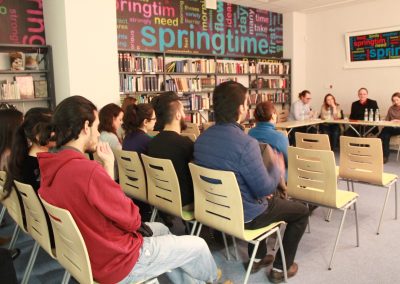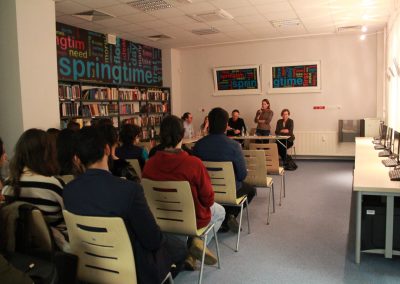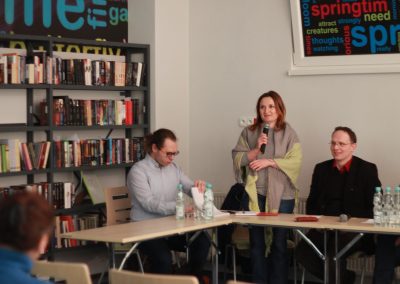On Wednesday we met in the Municipal Library Fil. 4 to participate in the debate entitled Gender ideology(ies): Man and woman – different by nature, inequal by society? We tried to find the answer to this question with our four guests: sociologists Borys Cymbrowski and Anna Czerner, philologist Katarzyna Molek-Kozakowska and biologist Elżbieta Pogoda.
We were aware that for most people the term gender is unfamiliar or even unfriendly, especially when someone is not a philologist or a social researcher, so we started with the basic questions: what gender is, how it exists in our respective fields of studies, and if there exists gender ideology. We can say that gender in general is about social consequences of being men, women or the others, because in the opinion of Elżbieta Pogoda even from a biological point of view there are more than only two sexes. And there is no evidence that one sex has an advantage over another.
In Polish media we encounter some false beliefs about the meaning of the word “gender”. But as Borys Cymbrowski mentioned it is a problem of confusion of nature with culture, because in the Polish language we have only one word (płeć) for gender and for sex. So some commentators confuse biological meaning with the cultural one. They accuse gender scholars of promoting a dangerous ideology which tries to convince people to choose their sex. As Anna Czerner said, the truth is that in the social sciences gender was a neutral category to analyse the relations between people in society, but unfortunately some institutions and politicians took one of the least popular topics in gender studies and used it as a basis to create and apply gender ideology as a political tool.
After that we focused mostly on language aspects within gender issues. Katarzyna Molek-Kozakowska indicated that for her it was easier to introduce herself in English than in Polish, because in Polish most names of academic professions have only a masculine gender, or even if it has a female gender, masculine forms sound more serious and more prestigious. But language is not a constant phenomenon – it is changing all the time. Twenty years ago we considered some female forms of words as strange, but today we take them for granted. We concluded that it is important to include more women-related forms to language, and it is one of the main catalysts of social changes in the public sphere.
We are really glad we could discuss it with you and with the citizens of Opole. We would like to thank you all for your presence and participation, and we hope to see you soon during another discussion. The aim of the whole debate was to clarify a little the problem of gender, but two hours is a short time when you are discussing such an important and complicated topic – so we treat this meeting only as a start. The debate is still open.
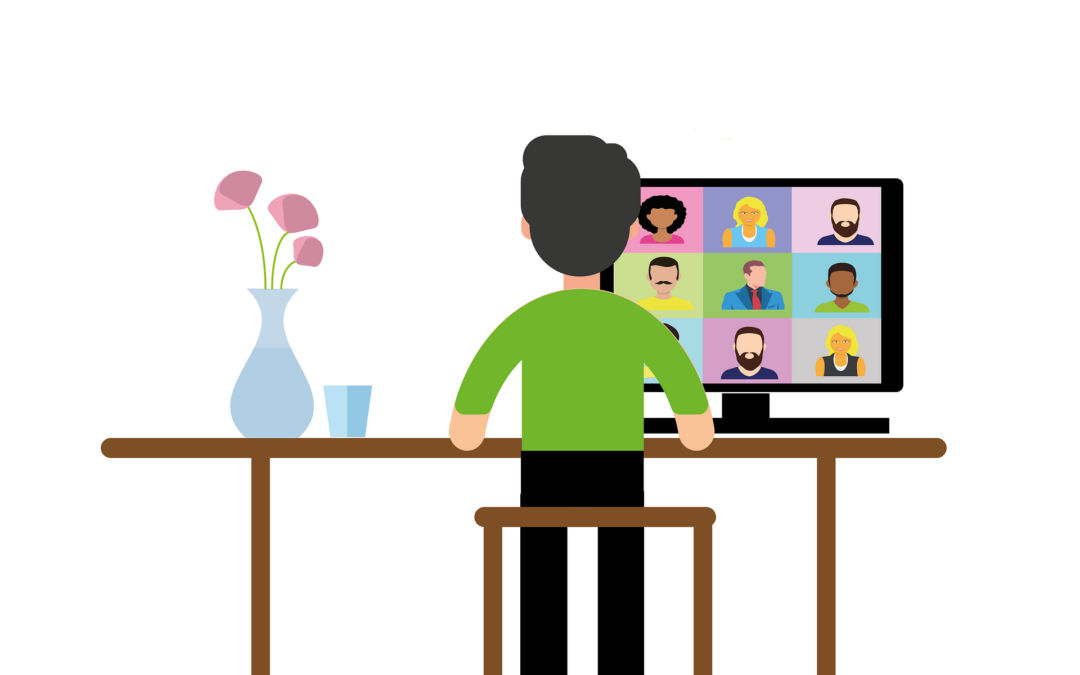
New office hours
Dear Students! Please be informed that due to the growing amount of work connected to admission process, the schedule of our office hours changes: Monday - 10 am. – 2 pm. Tuesday - 10 am. – 2 pm. Wednesday - closed Thursday - 10 am. – 2 pm. Friday - 10 am. – 2 pm....

English language oral exams for 2022/2023 admission process (22.06/ 23.06)
Dear Candidates, the below-attached link can be used to register for oral interviews for study programmes conducted in English. The interviews are planned to be carried out on 22.06.2022 and 23.06.2022. Those candidates who cannot provide a language proficiency...

Registration for entrance exams for candidates for Biology, concentration in Palaeobiology, full-time English MA study programme
Dear Candidates, the below-attached link can be used to register for oral exams for Biology, concentration in Palaeobiology, full-time English MA study programme. The interviews are planned to be carried out on 21.06.2022. All candidates for Biology, concentration in...

Electronic enrolment for the university-wide variable courses in the winter semester
Dear Students! The first round of electronic enrolment for the university-wide variable courses in the winter semester of the academic year 2022/2023 starts on June 01, 2022. It is important that each student, before registering in the account...

English language oral exams for 2022/2023 admission process (8.06 & 9.06)
Dear Candidates, the below-attached link can be used to register for oral interviews for study programmes conducted in English. The interviews are planned to be carried out on 8.06.2022 and 9.06.2022. Those candidates who cannot provide a language proficiency...
List of subjects required for BA programmes
List of subjects required for BA programmes Dear Candidates, In order to facilitate your registration in the IRK system, our Office has prepared the guideline of subjects from which grades have to be entered in the system during the registration for English...

Virtual Open Days UO
In June International Students Office will start a series of Virtual Open Days of the University of Opole for foreigners! Join the meeting via MS Teams platform to learn more about: - Studies in Poland; - The offer of study programmes at the University of...

English language oral exams for 2022/2023 admission process (26.05 & 27.05)
Dear Candidates, the below-attached link can be used to register for oral interviews for study programmes conducted in English. The interviews are planned to be carried out on 26.05.2022 and 27.05.2022. Those candidates who cannot provide a language proficiency...

Take part in Intensive Training for Economics Teachers! 2nd call
Application procedure available here Application documents shall be submitted by candidates till 11th May 2022 to Mrs. Halina Palmer-Piestrak from Erasmus+ Office, KMICIC hall, 31 Grunwaldzka Street Więcej aktualności
Evaluation of applications
Evaluation of applications Dear Candidates, Please be informed that verification of all applications will begin in May. Our Office will evaluate applications and qualify candidates for admission only once a week. We kindly remind you that an application will be...
